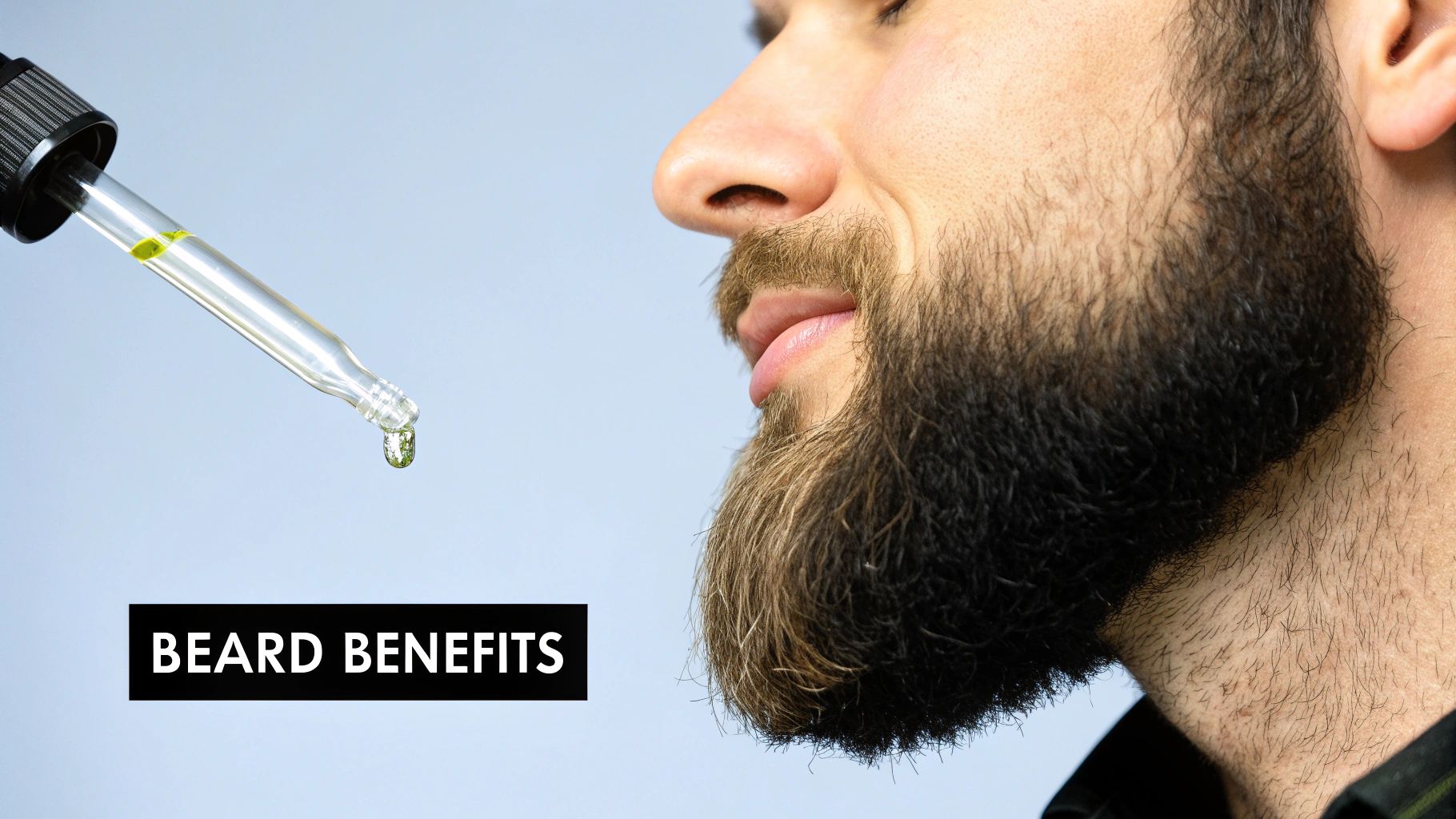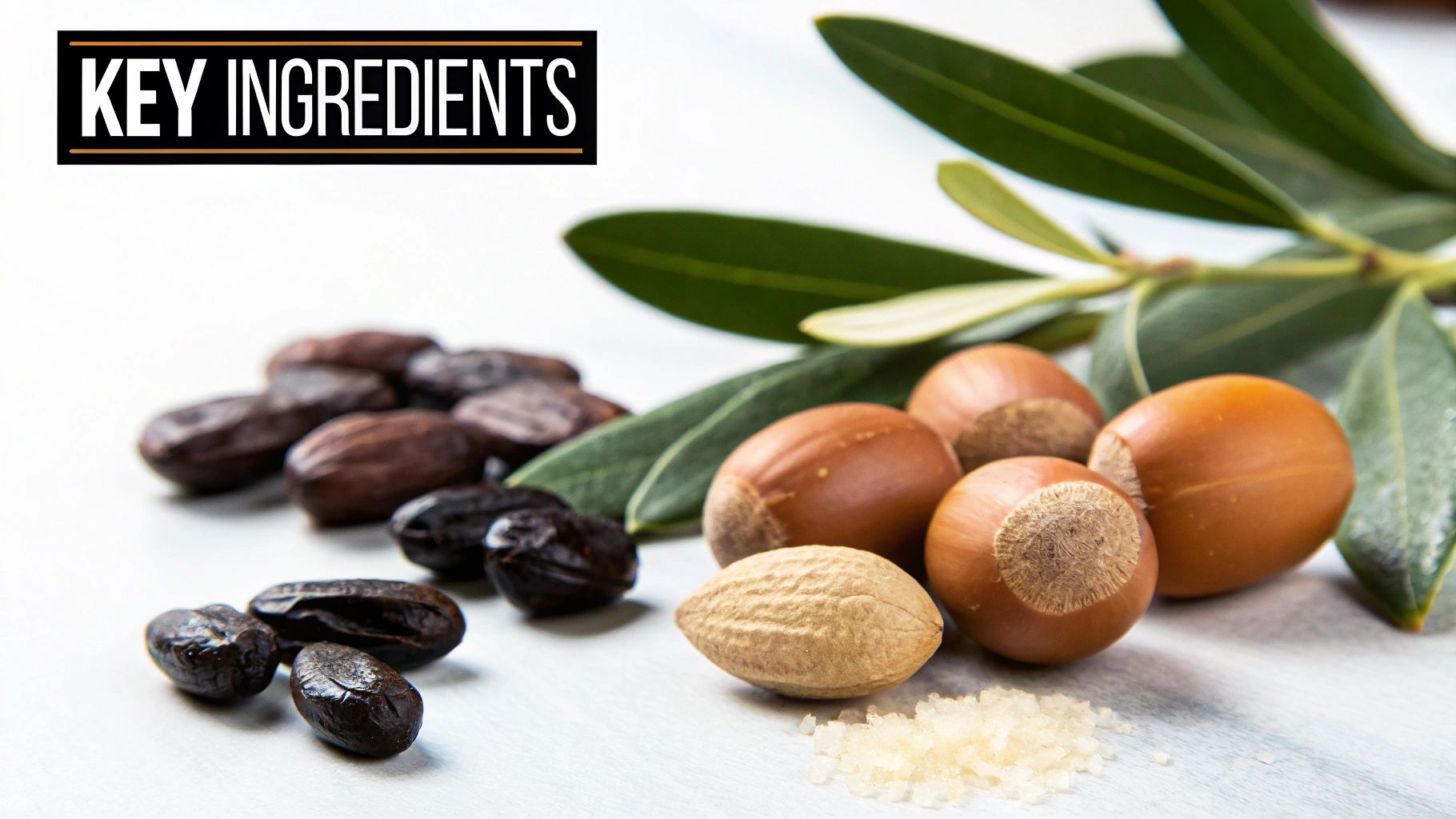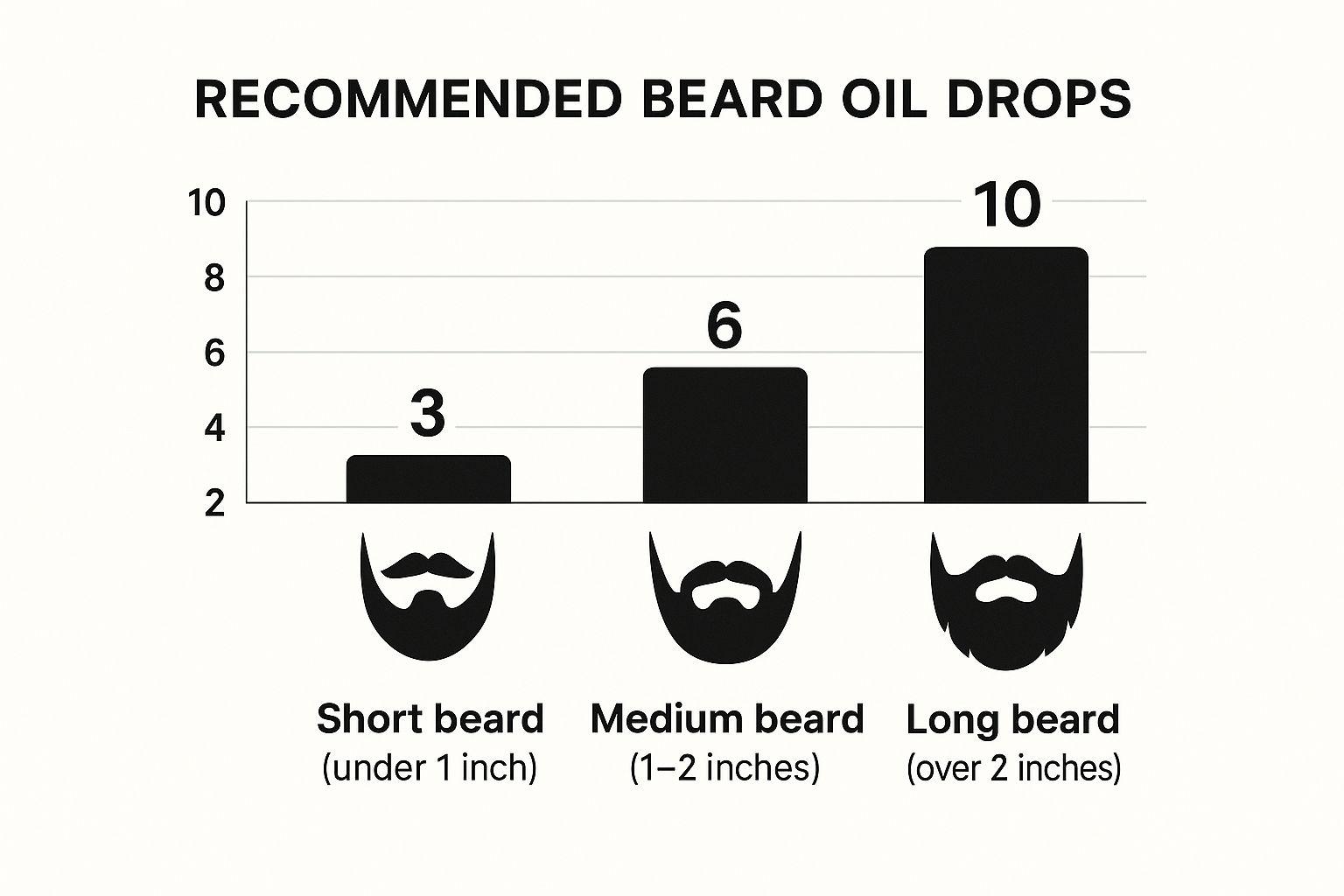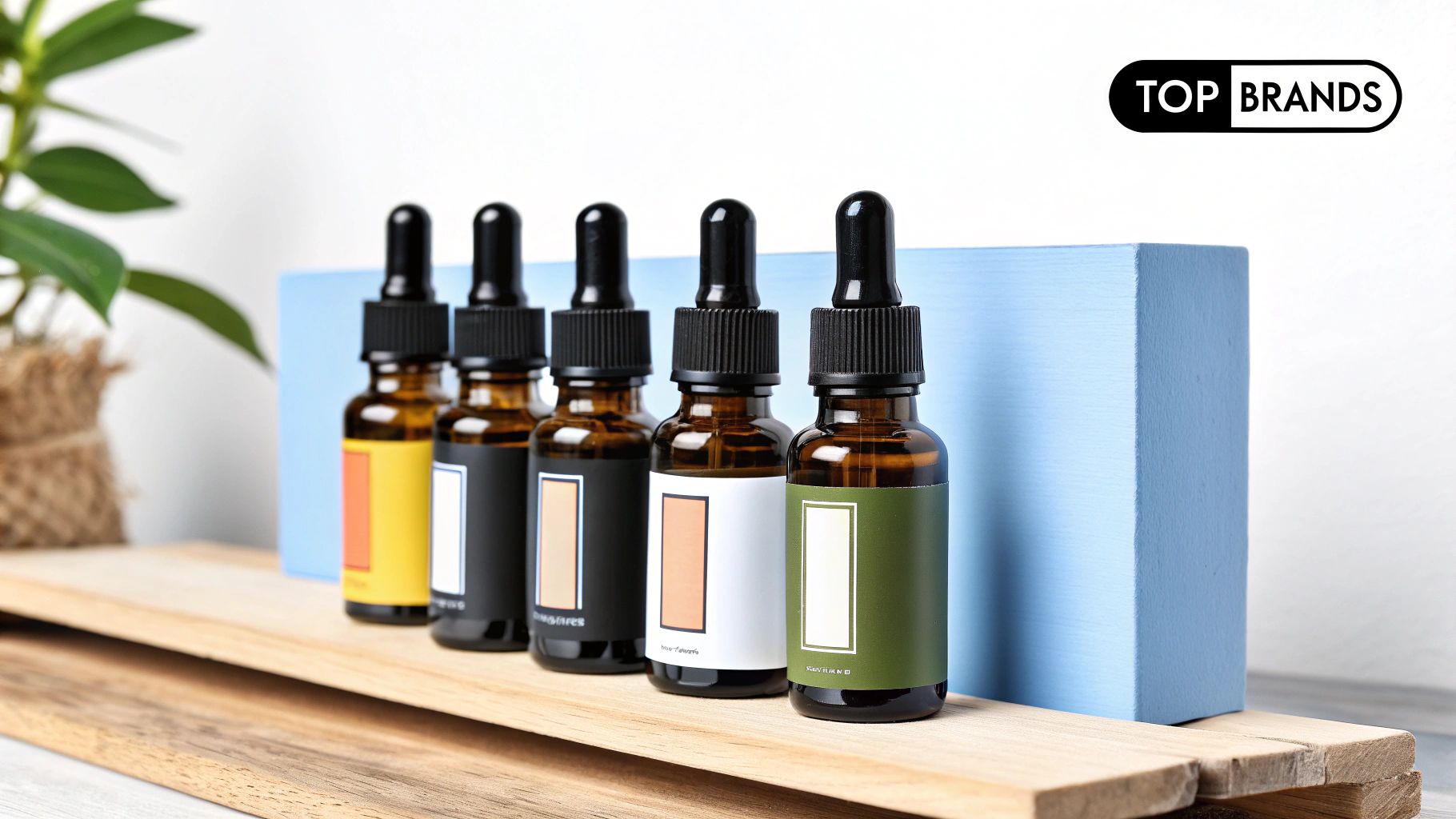Jan Elvis
08.10.2025

Jan Elvis
08.10.2025
Let's get right to it. A good beard oil is a meticulously crafted blend of carrier and essential oils, designed to moisturize both your beard hair and, just as importantly, the skin hiding underneath. Its main mission? To tackle the annoying problems that plague beardsmen—itchiness, that dreaded "beardruff," and hair that seems to have a mind of its own—all without making you feel like an oil slick.
Think of it as a specialized leave-in conditioner, but engineered specifically for your face.
At its core, a good beard oil is a two-for-one deal, working on both your facial hair and the skin it grows from. A lot of guys find their beard feels more like a Brillo pad than a soft, luscious mane, which can be seriously uncomfortable and even knock your confidence. A quality oil steps in to fix this by restoring the natural oils (called sebum) that washing strips away.
This deep moisturizing effect is really what separates the good stuff from the cheap imitations. It doesn't just coat the hair; a well-made oil actually soaks into the hair shaft and the skin to deliver hydration where it’s most needed. The payoff is a noticeably softer, more manageable beard and calm, flake-free skin.
Once you know what to look for, you can easily tell a premium blend from a bottle of snake oil. At the heart of any great beard oil is a simple, yet potent, mix of two types of ingredients:
It's the teamwork between these oils that truly makes a beard oil great. A properly formulated blend will absorb quickly, feel incredibly lightweight, and give your beard a healthy, natural-looking shine—never a greasy residue.
This quick table breaks down the key players you'll find in a top-tier beard oil.
| Component | Primary Role | Common Examples |
|---|---|---|
| Carrier Oils | Moisturizing, conditioning, and softening both hair and skin. They form the base of the oil. | Jojoba, Argan, Sweet Almond, Grapeseed, Coconut |
| Essential Oils | Providing scent and adding therapeutic properties like antiseptic or anti-inflammatory benefits. | Sandalwood, Cedarwood, Peppermint, Tea Tree, Lavender |
| Vitamin E | Acting as a natural preservative to extend shelf life and providing antioxidant benefits for skin health. | Tocopherol |
Understanding these components helps you see that a beard oil is more than just a nice-smelling product; it's a carefully balanced grooming tool.
Ultimately, the best beard oil is the one that solves your specific issues, whether you're battling dryness, an infuriating itch, or just trying to tame a few stubborn flyaways. It’s the one product that can take your beard from just being there to looking and feeling fantastic.

To figure out what separates a great beard oil from a mediocre one, you have to look past the fancy label and understand what’s actually in the bottle. I like to think of a high-quality beard oil like a well-built house. You need a solid, dependable foundation before you can even think about the paint and decor.
In the world of beard grooming, that foundation is made of carrier oils. These are the heavy lifters, making up over 95% of the formula. Their main job is to "carry" the more fragrant essential oils and deliver some serious moisture to your beard and, just as importantly, the skin hiding underneath it.
Honestly, without a solid base of carrier oils, you’ve just got a bottle of cologne that won't do your beard any real good.
Carrier oils are the unsung heroes of beard care, typically pressed from the nuts, seeds, or kernels of plants. Each one has its own unique benefits, which is why the best beard oils usually mix a few together for a more powerful, well-rounded effect.
Jojoba Oil: This one is a legend in the grooming world for a good reason. Its chemical makeup is remarkably close to sebum, the natural oil your own skin produces. This allows it to absorb quickly without feeling greasy or clogging your pores, helping to keep everything balanced and calm.
Argan Oil: You’ll hear this called "liquid gold," and it’s not an exaggeration. Packed with fatty acids and Vitamin E, Argan oil is a powerhouse for softening coarse, wiry whiskers and taming annoying frizz. It’s what gives a beard that smooth, touchable feel.
These oils aren't just filler; they are the core of the product. Learning about the best carrier oils for skin and hair can really elevate your grooming game.
If carrier oils are the foundation and walls of the house, then essential oils are the custom paint job and fine furniture. These are super-concentrated plant extracts added in tiny amounts, but they’re what give the beard oil its character and unique therapeutic punch.
A great beard oil uses essential oils not just for fragrance, but for function. The scent should be pleasant but not overpowering, and the oils should complement the nourishing work of the carriers.
Some of the most popular and effective essential oils you'll find are:
Tea Tree Oil: This is your go-to for keeping things clean. With strong antibacterial and anti-inflammatory properties, it helps prevent the dreaded beardruff and keeps the skin underneath free from itchiness or breakouts.
Sandalwood Oil: This oil provides that classic, warm, woody scent that many guys are after. But it’s not just about the smell; Sandalwood also has a calming effect on the skin, making it great for soothing irritation.
More and more guys are looking for natural ingredients, partly because of skin sensitivities and partly due to a bigger focus on what we put on our bodies. This shift has pushed brands to get creative, blending workhorses like jojoba and argan oil with vitamin E to create products that really perform. Being able to read an ingredient list is your best tool for finding an oil that will genuinely nourish your beard.

Knowing the ingredients is one thing, but what does a good beard oil really do for you day-to-day? Let's get past the label and talk about real, noticeable results. A great beard oil is a problem-solver, plain and simple. It's made to fix the most common issues that get in the way of having a beard you're proud of.
Think of it this way: your skin is the soil, and your beard is the garden. You can’t expect lush, healthy plants from dry, neglected soil. A top-notch beard oil gets moisture and nutrients right to the source, solving a bunch of problems all at once.
One of the first things that drives guys crazy when growing a beard is the itch. That relentless, maddening itch, often followed by those dreaded white flakes on your shirt. That’s beardruff—and it's just your skin's way of screaming for moisture.
A good oil is like a targeted rescue mission for your skin. It calms everything down, delivering hydration where it's needed most. By getting the skin back in balance, it stops the itch cold and gets rid of the flakes. The relief is almost instant, and so is the confidence you get from not worrying about a "snowy" shirt.
A beard shouldn't be a source of irritation. The primary function of a high-quality beard oil is to make both your beard and the skin underneath it feel comfortable, healthy, and completely calm.
Does your beard feel more like a scouring pad than soft hair? That wiry, coarse texture is a super common complaint. It happens when your beard hair gets dehydrated and brittle, stripped of the natural oils that keep it soft and manageable.
This is where the magic of carrier oils like Argan and Jojoba comes in. They don't just sit on the surface; they actually soak into the hair shaft, hydrating it from the inside out. Using it daily makes a huge difference—you'll end up with a beard that's noticeably softer to the touch. Trust me, both you and anyone who gets close to you will appreciate it.
Here’s a quick rundown of how a quality oil overhauls your beard's look and feel:
At the end of the day, a good beard oil is more than just a grooming product. It’s a foundational tool for creating a healthy environment for both your skin and your hair. It’s what allows for better, more comfortable growth and makes sure your beard looks and feels its best, every single day.
Knowing what a good beard oil is made of is one thing, but finding the right beard oil for you is the real mission. Think of it like buying a great pair of boots. They might be beautifully made, but if they don't fit your feet, they're useless. The same logic applies here—the best oil is the one that fits your specific skin type, beard length, and even your personal style.
This personalized approach is what elevates a grooming routine from just okay to genuinely great. You have to work with what you've got. A guy with oily, acne-prone skin has completely different needs than someone dealing with dry, flaky skin under their beard. Likewise, a short, neat stubble doesn't need the same heavy-duty hydration as a long, thick beard that soaks up moisture like a sponge.
Your skin is the foundation of your beard. Get this part wrong, and even the most premium oil on the market won't give you the results you’re after. It's all about finding a blend that works with your skin's natural state, not against it.
For Dry or Sensitive Skin: You need oils that are heavy on the nourishment and have anti-inflammatory properties. Argan and Jojoba oils are your best friends here. They offer deep hydration, and Jojoba, in particular, is brilliant because its structure is incredibly similar to your skin's natural oils (sebum). This helps soothe irritation and banish beardruff without triggering a reaction.
For Oily or Acne-Prone Skin: If you're prone to breakouts, you'll want a lighter oil that won't clog your pores—something non-comedogenic. Grapeseed and hemp seed oils are fantastic choices. They absorb quickly, moisturize effectively, and can even help get your skin’s own oil production under control.
Your beard oil should solve skin problems, not create new ones. Prioritizing your skin type ensures you get all the benefits of a soft, healthy beard without frustrating side effects like itchiness or breakouts.
The market has really expanded to meet these diverse needs. A good sign of a quality brand is that they offer specialized options, from conventional blends to organic formulas designed for sensitive skin. You can discover more about the expanding organic beard oil market to see how this consumer awareness is shaping the products available today.
The length of your beard is a major factor in how much oil you should use and how often. It’s simple, really: a longer beard has more hair, and those hair tips are a long way from the natural oils your skin produces. That means they need more help to stay hydrated and healthy.
The infographic below gives a pretty solid guideline for how many drops to use based on your beard's length.

As you can see, a bigger beard has a bigger thirst. Don't be shy with the oil as it grows.
To make it even easier, here's a quick reference table to help you find the carrier oils that best suit your beard and skin.
| Beard/Skin Type | Recommended Oil Properties | Best Carrier Oils |
|---|---|---|
| Dry Skin / Coarse Beard | Deeply moisturizing, rich in fatty acids | Argan, Jojoba, Avocado |
| Oily Skin / Fine Beard | Lightweight, fast-absorbing, non-comedogenic | Grapeseed, Hemp Seed, Hazelnut |
| Sensitive / Irritated Skin | Anti-inflammatory, soothing, hypoallergenic | Jojoba, Sweet Almond, Apricot Kernel |
| Normal Skin / All Beard Types | Balanced, versatile, maintains moisture | Jojoba, Sweet Almond, Grapeseed |
This table is a great starting point for checking ingredient lists and making sure the product you choose is built to work for you.
Last but not least, don't overlook the scent. You’re going to be smelling this stuff all day, so it better be something you actually like. The best oils use natural essential oils for fragrance, which smell far more authentic and are less overpowering than cheap, synthetic perfumes.
Finding the right product is all about matching the right ingredients to your personal needs. Once you factor in your skin, beard length, and scent preference, you can easily find the perfect beard oil to take your grooming game to the next level.
Having a great beard oil is only half the battle. If you don't apply it correctly, you're just not getting the full benefit. Think of it less like a chore and more like a simple, daily ritual that makes a massive difference in the health and look of your beard.
The real goal isn't just to slick down your beard hair. You need to get that oil to the skin underneath, which is where problems like itchiness, beardruff, and irritation start. A lot of guys just smear it on the surface, which wastes the product and leaves their beard looking greasy.
Timing is everything. The absolute best time to put on beard oil is right after a warm shower. The steam opens up your pores and hair follicles, so they're ready to soak up all that goodness. Just make sure to towel-dry your beard until it’s slightly damp, not sopping wet.
When it comes to how much to use, a little goes a long way. The perfect amount really depends on the length and thickness of your beard.
It's always better to start small. You can easily add another drop or two if you need it, but it’s a pain to fix an oily mess if you go overboard.
Remember, you want the oil to absorb completely, leaving your beard soft with a healthy sheen—not slick and greasy. If your hands still feel super oily after you're done, you've used too much.
Nailing the technique is easy, but it’s crucial for getting that even distribution and maximum benefit.

It wasn’t that long ago that beard care felt like something reserved for a select few. Now, beard oils and grooming products are everywhere, and taking care of your facial hair has become a standard part of the modern man's routine.
This isn't just about following trends. It’s part of a bigger cultural shift in how guys approach self-care. Looking after yourself is no longer seen as an indulgence—it’s a fundamental part of a healthy lifestyle. Taking a few minutes for a grooming routine has become a powerful, personal investment.
The numbers back this up. This is a global movement, with the worldwide beard oil market hitting around USD 979.6 million in 2024 and showing no signs of slowing down. It’s clear that a growing appreciation for personal wellness and evolving style have turned beard care into big business.
For many guys, working a few drops of oil into their beard is more than just a step in getting ready. It’s a moment of mindfulness. It’s a simple, grounding act that helps set a positive tone for the rest of the day.
Investing in a quality beard oil isn't just about taming your beard—it's about investing in a routine that helps you feel centered, confident, and ready to face the day.
This small practice aligns perfectly with other core grooming tips for men, where consistency is king. Think of it as a small win to start your day. If you're curious about why these simple habits feel so good, you can dive into the psychology behind daily "reset rituals" to see how small actions can create massive shifts in your mindset.
Alright, so we've covered what goes into a great beard oil. But I know you've still got questions about how it all works in the real world. Let's tackle some of the most common things guys ask, so you can get the most out of your grooming routine.
For most guys, hitting your beard with oil once a day is perfect. The best time to do it is right after a warm shower. Your pores are open, and your skin and hair are primed to soak up all that goodness.
Now, if your beard is especially wiry or you live somewhere super dry, you might need a little extra help. In that case, adding a second, much smaller application before bed can keep things from drying out overnight.
The real secret here is consistency. Think of it like watering a plant. A little bit every day does way more good than a lot all at once. Make it a daily habit, and your beard will thank you.
Let's be real: beard oil isn't a magic potion for growth. Think of it more like a growth supporter. It creates the absolute best conditions for your beard to thrive.
By moisturizing the skin, it stops itchiness and flakes. By conditioning the hair, it prevents breakage. This lets your beard grow to its full, natural potential, making it look healthier and thicker. While some ingredients might give your follicles a little wake-up call, the oil itself won't change your genetics.
A good beard oil, used the right way, should disappear into your skin and beard, leaving them feeling soft, not greasy. If you're ending up with an oil slick on your face, it's almost always one of two things.
Cheaper oils with heavy, junky fillers can also be the culprit. That’s why sticking to formulas with lightweight, fast-absorbing oils like Jojoba and Argan is a game-changer for getting that clean, conditioned feel.
Ready to build a routine that boosts your confidence? The Main Character collection is designed to help you look and feel your best every day. Find your new grooming essentials now.